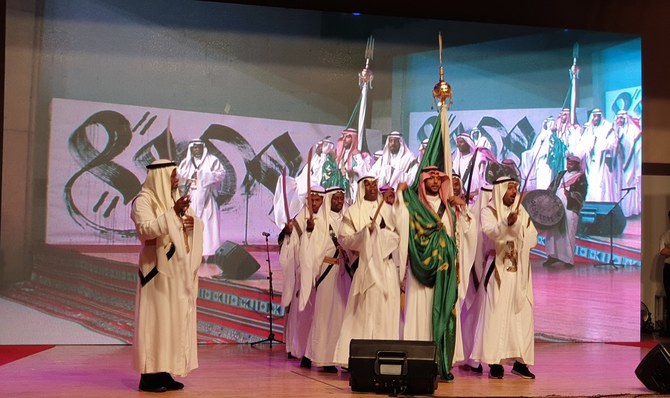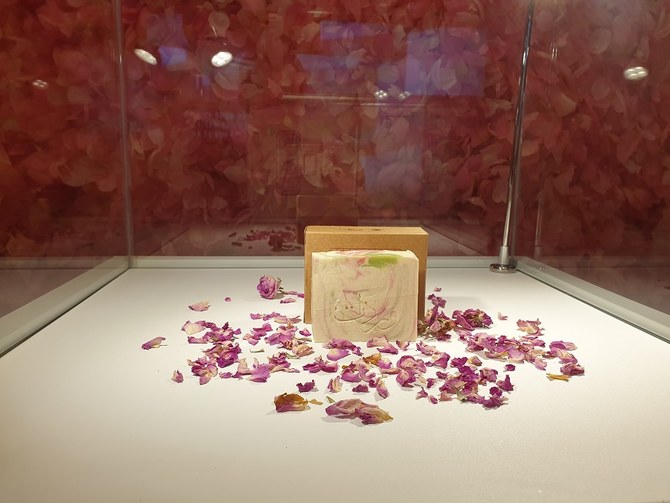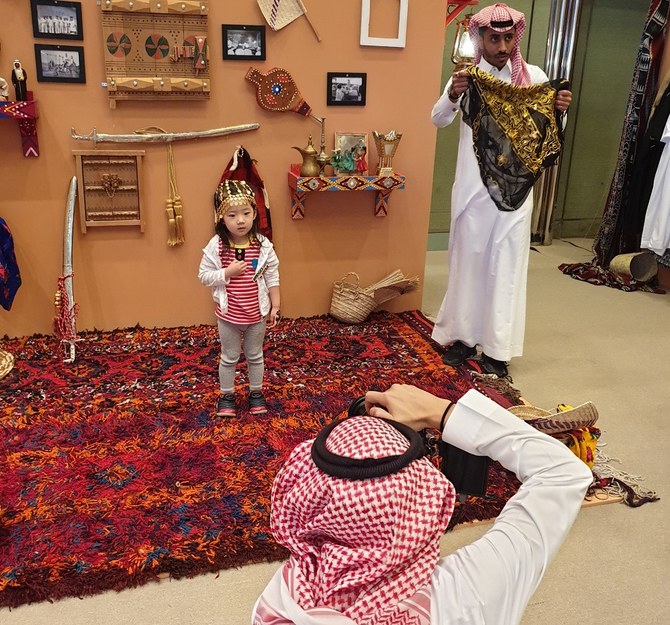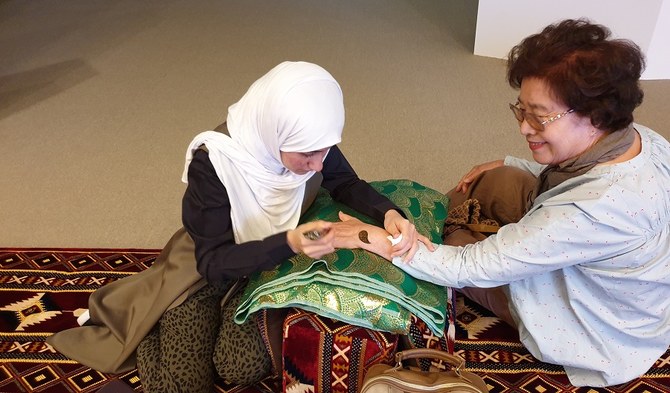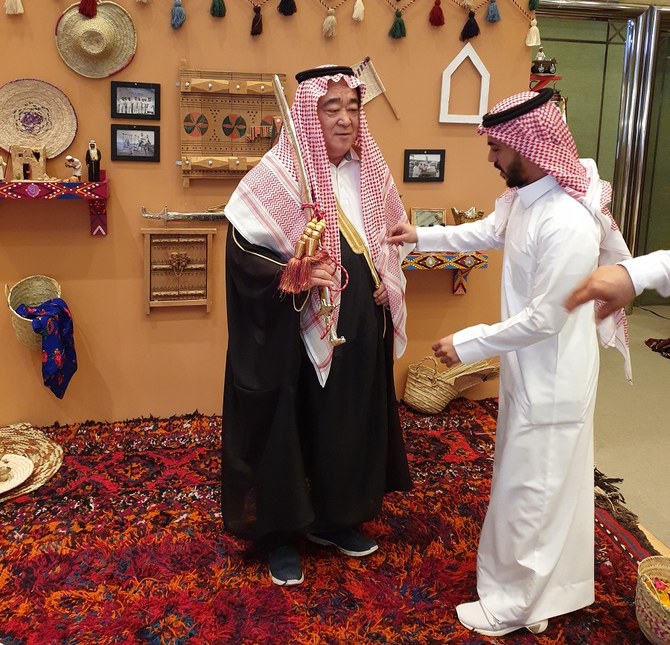SEOUL: A unique cultural festival filled with the music and dance of Saudi Arabia were attracting South Korean visitors at the heart of Seoul Thursday.
The festival is Saudi Arabia’s global cultural campaign titled “Bridges to Seoul” organized by the King Abdualaziz Center for World Culture marking the historical visit of Saudi Crown Prince Mohammed bin Salman to the country in 21 years.
“This Saudi Arabian cultural exhibition is the first in Asia,” Kim Hee-joo, a staffer for Ithra, told Arab News. “This main objective of this campaign is to promote Saudi Arabian cultures in South Korea, many of whose people are still unfamiliar with Saudi cultures despite the close relationship between the two governments.”
The exhibition, which runs from June 24 to July 3, is being held at the convention center of Grand Hilton Seoul. The exhibition offers an opportunity for South Koreans to experience the richness of Saudi culture and heritage.
Visitors can to try on Saudi costumes and accessories for photo sessions and get their Saudi Arabian names written in Arabic script.
“We’re happy to share Saudi cultures with South Koreans. This is a great opportunity for introducing our cultures to South Koreans and bridging cultural gaps between the two countries,” said Muhammed alduhaim at the photo costume booth.
South Korean visitors were enjoying the exhibition with great interest.
“When you talk about Saudi Arabia here, many people including me just think of desert extremely hot weather and something like that,” Choi Bok-nam, 55, said. “However, I’m impressed to see beautiful flower and get to know Saudi’s weather conditions vary after seeing pictures displayed here. I want to travel to Saudi next time.”
For some elder men, who had been in Saudi Arabia for work, the exhibition offered a chance to reminiscent of the old days in Saudi.
“I had worked at Saudi Arabia as an engineer for a year about 30 years ago,” Lim Joo-hwan, 64, said. “This event makes me reminisce about the days in Saudi, and actually I’ve learned new aspects of Saudi cultures here though I lived there just for a year.”
Joo Duk-choon, 76, was fascinated by Taif roses and products made from the local flower.
“I had little knowledge of Saudi Arabia. I thought Saudi was just an oil-rich nation.” he said.
Hanan, 29, from Saudi Arabia said there still need to be communications programs to spread Saudi cultures to South Korea.
“I think South Koreans don’t know about Saudi Arabia as much as Saudi Arabians know about Korea,” said Hannah, who have studied at a Korean university for international studies. “Young generation in Saudi Arabia know much about Korean hallyu (the Korean wave of pop culture), dramas, cultures, but I feel Saudi Arabia doesn’t enough media and stories they can tell to South Koreans.”
She hoped the crown prince’s latest visit to South Korea would be a turning point for getting ever closer between the people of Saudi Arabia and South Korea.
“I feel like the crown prince has made a lot of changes in Saudi, especially for women, media and culture, so I think it’s changing a lot,” she added.
Prince Mohammed spearheads the Vision 2030 economic reform plan aimed at diversifying the Kingdom’s oil dependent economic structure to other industry fields, such as culture and tourism as well as information and communications technology and new sources of energy like hydrogen.
Saudi Arabia seeks to bridge cultural gaps with South Korea
Saudi Arabia seeks to bridge cultural gaps with South Korea

- Seoul welcomed historical visit of Saudi Crown Prince Mohammed bin Salman to the country in 21 years
- A grand cultural exhibition, part of Saudi's global cultural campaign titled “Bridges to Seoul,” to held for Koreans
Citrus festival highlights AlUla’s heritage, economy

- The rise in visitor numbers reflects the festival’s prominence as a major agricultural and community event. It runs until Jan. 16
ALULA: The AlUla Citrus Festival has seen a remarkable turnout of residents and visitors as it has coincided with the mid-year school break, the Saudi Press Agency reported.
The festival is being held at the farmers’ market in the cultural oasis, amid an environment that blends stunning natural beauty with the governorate's rich agricultural heritage.
The rise in visitor numbers reflects the festival’s prominence as a major agricultural and community event. It runs until Jan. 16.
It allows visitors to explore local products and purchase citrus fruits directly from farmers, highlighting the deep connection between the people, their land, and agricultural legacy.
The festival showcases a diverse selection of AlUla’s finest citrus fruits, alongside platforms for local producers, the SPA added.
The event also features interactive family-friendly activities and live cooking demonstrations.
It contributes to revitalizing agricultural economic activity and reinforces agricultural seasons as a pillar of sustainable development in the governorate.
The AlUla Citrus Festival is a key social and economic event and gives local farmers a vital platform to showcase and sell their produce, supporting the agricultural economy of a governorate home to nearly 5,000 productive farms.


